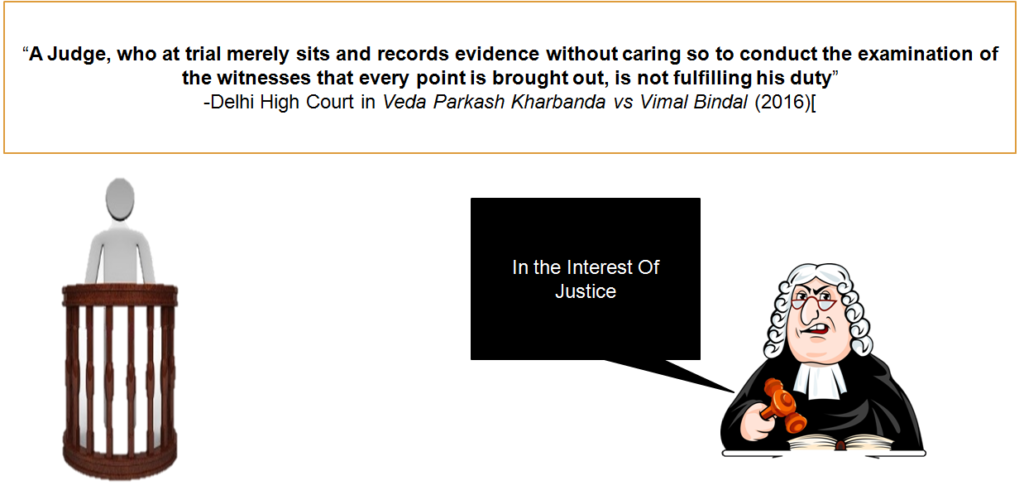Section – Power of Judge to Put Question
The Judge may, in order to discover or to obtain proper proof of relevant facts, ask any question he pleases, in any form, at any time, of any witness, or of the parties about any fact relevant of irrelevant; and may order the production of any document or thing; and neither the parties nor their agents shall be entitled to make any objection to any such question or order, nor, without the leave of the Court, to cross-examine any witness upon any answer give in reply to any such question:
Providedthat the judgment must be based upon facts declared by this Act to be relevant, and duly proved.
Providedalso that this section shall not authorize any Judge to compel any witness to answer any question or to produce any document which such witness would be entitled to refuse to answer or produce under sections 121 to 131, both inclusive , if the question were asked or the document were called for by the adverse party; nor shall the Judge ask any question which it would be improper for any other person to ask under section 148 or 149; nor shall he dispense with primary evidence of any document, except in the cases herein before excepted

Section 165 has provided extensive power for the judges on interest stating administration of justice. It provides that the judge can put the witnesses or the party at any questionable if he thinks that this is necessary in order to know the truth about the case or to make the case clearer.
This section provides the judge the following powers:
The Judge may, in order to discover or to obtain proper proof of relevant facts, ask any question he pleases-
- in any form,
- at any time,
- of any witness,
- or of the parties,
- about any fact relevant or irrelevant; and
- may order the production of any document or thing;
The provision has an exception which says a judge cannot compel to witness to answer any question or produce such document which witness is entitled to refuse. It includes both sec 121 and sec131.
To prove this power of judge Supreme Court in the case of State of Rajasthan vs Ani @ Hanif And Others[6] stated that “Section 165 of the Evidence Act, 1872 gave vast and unrestricted powers authority on the trial court to put “any question he pleases, in any form, at any time, of any witness, or of the parties, about any fact relevant or irrelevant” in order to discover relevant facts.”
Section 165 of the Evidence Act and Section 311 CrPC
The Section 165 of the Evidence Act gives a power to the Court to call for any document and Section 311 of the Cr.P.C give a wide discretion to summon material witness or to examine a person present in Court or to call a witness already examined. Hence, Section 165 of the Evidence Act and 311 of the Cr.P.C confers a wide discretion and hence, the proposition of the law has been well settled in AIR 1968 SC 178 (Jamatraj Kewalji Govani Vs. State of Maharashtra) that the Court can summon a material witness and even call for material document and hence two Sections 311 of the Cr.P.C and 165 of the Evidence Act confers jurisdiction on the Judge to act in aid of justice and these two Sections between them confers jurisdiction on the Judge to act in aid of justice and it is a total discretion of the Court and only rigor to see whether the power has been exercised for a just decision of the Court.
Section 165 of the Evidence Act and Section 311 CrPC
When sec 165 of the Indian Evidence Act 1872 is in hand in hand with sec 311 of the Code of Criminal Procedure 1973 gives enormous authority to the judiciary to take any steps to ensure best and fair justice
There are two categories in judicial system in which way courts work.[3]
Adversarial justice system
Inquisitorial justice system
The adversarial judicial system is a two-way structure where advocates of two parties present their matter and the judge delivers the judgement according to it. In the inquisitorial justice system, part of the court takes an active part in the investigation of the case. The magistrate observing the case prior to case investigate the matter of the case.
The pillar of the adversarial justice system is a presumption of innocence. Judges normally are advised to not to interfere into trial proceedings. Production of evidence and bringing witnesses is the duty of both prosecutor and defendant. However, there are some circumstances where the only selective pieces of evidence are presented before the court in order to protect either accused or possible culprit. In that case, it is the judge’s duty to demand proper evidence or to bring required witness on their own behalf.
There are two categories in judicial system in which way courts work.[3]
Adversarial justice system
Inquisitorial justice system
The adversarial judicial system is a two-way structure where advocates of two parties present their matter and the judge delivers the judgement according to it. In the inquisitorial justice system, part of the court takes an active part in the investigation of the case. The magistrate observing the case prior to case investigate the matter of the case.








No comment